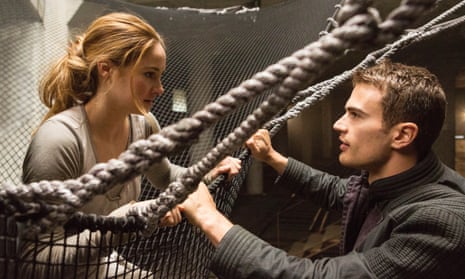How Orwellian is college? Very, if Divergent is to be believed. Adapted from Veronica Roth’s bestselling novel, it stars Shailene Woodley as Beatrice, a 16-year-old girl trying to find her place in a world seemingly modelled on a series of giant frat houses, each named after an abstract virtue or noun. There’s Amity, whose people farm the land, Amish-style; there’s Abnegation, who think only of others and work in government; there’s Candor, who tell the truth, doubtless on course for a career in daytime TV; there’s Erudite, who like to show off their vocabulary but can’t for the life of them work out why they are an adjective and not a noun like everyone else.
Finally, there’s Dauntless, very much the extreme sports set, defined principally by their carelessness with regard to train timetables, since they always run, jump and leap for the train home to an accompaniment of Stomp-style drumming. These gonks are being groomed for jobs in the military, although how you would get them to show up on the battlefield is anyone’s guess. I’ve seen better discipline in the Keystone Cops.
Beatrice, who wears baggy skirts, boots and her hair in the loose bun of an Emily Bronte fan, jumps ship at her initiation ceremony and chooses Dauntless over her native Abnegation, and very soon, she is running and jumping for moving trains, too, all the while harboring a secret: her aptitude test revealed her to be “divergent”, a freakish original thinker, fated to be hunted and killed if she is ever found out. Quite why she faces this drastic a penalty is hard to fathom, given that the rest of Roth’s future society seems wholly bent to the task of identifying and nurturing the skillsets of its teenagers. Roth has filled out her world without thinking it through as a dramatic space. “They built fences for a reason,” Beatrice is told, which in any other story would be a prelude to monsters, but no more is heard of it.
Instead, the bulk of this 160-minute film is taken up with an endless slog of evaluations and physical aptitude tests in smoky, diffusely lit interiors that resemble a Bill Fitzgibbons art installation. Director Neil Burger amps up every snap, crackle and pop, but there’s no escaping the fact: what we have is science fiction that devotes its considerable resources to imagining the future of SAT tests. Maybe that’s why Winston Smith went awol: a droopy grade point average.
The centrepiece of these is The Matrix-style virtual reality immersion designed to “explore your worst fears,” administered by Beatrice’s instructor, Four (Theo James), a hunk who stares through his eyebrows without giving the impression of ever really seeing anyone. Her worst fears turns out to be a rather spiffy replay of Hitchcock’s The Birds, but bright spark that she is, she snaps out of it by muttering, “This isn’t real.” This causes Four to stare at his eyebrows with even greater intensity. “You can’t do that,” he fusses. “You have to pretend that it’s real.” And so she humors him.
If the aim is to dramatise the patience that smart children must martial to fake IQ tests that are dumber than they are, then point taken, but when are film-makers going to learn what a losing proposition virtual reality is at the movies? The movies are virtual reality enough, so the only possible development is for the images to prove less substantial than they already seem – the wrong direction, surely.
All of this is toughest on Shailene Woodley, a lovely performer with big, brown eyes that seem to drink in everything, and an edge of shyness that is never quite dispelled, not even by the kick-boxing scenes. “You’re not going to shoot me,” says her fratboy-ish nemesis, Miles Teller. “Why does everyone always say that?” she says, before shooting him. The plot wakes up in the last 20 minutes, though whether this is a touching recreation of the rhythms of adolescence or a python-like regurgitation of the book’s plotting is hard to say: mom (Ashley Judd) arrives with news of the revolutionary underground, swiftly followed by Kate Winslet, vowing bad things for mom. The same thing happened to the last Hunger Games movie, the first hour of which could easily have been removed without anyone noticing.
The filmmakers of these young adult novels would appear to be in something of a bind, with a loyal fanbase commanding fidelity to books whose plotting is not shaped for the screen. Spielberg had the right idea when he was in the frame to adapt the Harry Potter series: crunch the first two books into one, and break out of Hogwarts sooner, for a movie in which magic comes to muggle suburbia. Instead of which, it was back to bloody Hogwarts, in film after film. Don’t kids want to get out into the world these days? All their plots seem to be cuckoos, afraid or unwilling to leave the nest.

Comments (…)
Sign in or create your Guardian account to join the discussion